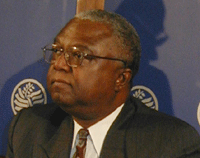
Are You A Witness Or With Information?
By Musue N. Haddad
The Perspective
Atlanta, Georgia

Are You A Witness Or With Information?
By Musue N. Haddad
The Perspective
Atlanta, Georgia
 |
|
Dr. Amos Sawyer
|
Any Liberian with information as to how Charles Taylor aided and abetted murder and mayhem in Sierra Leone has been challenged to consider assisting authorities of the Special Court for Sierra Leone in ensuring that those who bear greatest responsibilities for atrocities during that country's ten-year war are persecuted.
In an exclusive interview, Dr. Amos C. Sawyer, Liberia's Former Interim President who has been among those advocating the indictment of Taylor and all of those who were major players in the Sierra Leone tragedy challenged Liberians to take the initiative in bringing Taylor and his cohorts to judgment. He added, "It is time for Liberians who have information as to how Mr. Taylor provided, how he was engaged in the diamond business and how he exploited a relationship with Sierra Leoneans to aid and abetted murder to make their testimony available," Sawyer said.
He said the use of Liberia as an epicenter of a system of conflict is a stain on Liberia and its citizens urging those with information that they owed it to themselves, to their country and to our largest humanity to testify.
"The Liberian people who care about how their presidency has been used as the instrument of criminality and of plunder, how their presidency has been used as a murder chamber by Mr. Taylor are partially responsible for his persecution," Sawyer said.
The Sierra Leone Court set up to try those who committed atrocities during the war were created through an agreement between the United Nations and the government of Sierra Leone.
David Hecht, spokesman for the court recently said the court will not be looking at "each individual but rather at those who bear the greatest responsibility" for the atrocities carried out during the war.
Analysts said the Sierra Leone Court will not be interested in passing judgment on each person who acted on order except where those people used the order to its extreme and are liable for enormous atrocities.
"There should be Liberians who saw and have information of Charles Taylor meetings with members of the rebel Revolutionary United Front [RUF] and those who sat on meetings for the planning and executions of diamond and gun businesses. Even those who ran errands are potential witnesses who can testify," our source said.
Although reports from Sierra Leone indicate that the Court has begun gathering evidence, Dr Sawyer said the persecution of Charles Taylor is partly the responsibility of the Liberian people.
Sawyer said Liberians who can testify to Taylor's 'major' role in Sierra Leone should take the initiative since doing so will bring some level of integrity to the highest office, the Liberian presidency, which he said has been brought to its lowest point ever under the Charles Taylor administration.
He said even after Charles Taylor was no longer a warlord, he continued his cooperating with Foday Sankoh thus using the Liberian presidency and other state institutions as instruments of plunder and murder which extended in another country - something that should be of concern to the pride of Liberians.
In order for Liberians to begin to resolve their problems, they must begin to investigate, to gather the root of what happened viewing the Sierra Leone Court as an opportunity to address the "gravest" wrong that Liberians have done to others, he said.
He urged Liberians as aggrieved party to put together their evidence and make it available to the persecutors of the Sierra Leone court for their judgment and independent assessment.
Sawyer proposed that Liberians begin to put in place a mechanism where people acting under Taylor's orders can be identified, their cooperation secured and where they will be given some protection as they provide their testimony even though their protection is the decision of the persecutors for the Sierra Leone Court.
Observers said many of the atrocities committed during the 1991-2001 war in Sierra Leone were said to be the acts of rebels of the Revolutionary United Front (RUF) led by Foday Sankoh who is currently in jail, the Armed Forces Revolutionary Council (AFRC), the West Side Boys, a splinter group of the AFRC and others. The atrocities included amputation of limbs, rape and other human rights violations.
The Sierra Leone Special Court, expected to cost a total of about US $60 million, and is expected to complete its work within three years.
